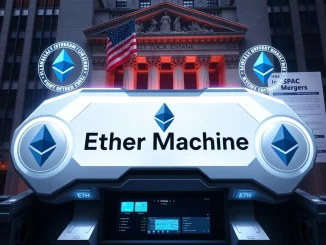
In a world where financial markets often seem manipulated and controlled, a prominent voice in the crypto sphere has ignited a crucial debate. Arthur Hayes, the co-founder of BitMEX, a well-known cryptocurrency derivatives exchange, has boldly stated that Bitcoin operates as a genuine free market, a stark contrast to the traditional stock market. This statement, made on social media platform X, has resonated deeply within the crypto community and beyond, sparking discussions about the fundamental differences between decentralized digital assets and conventional financial instruments.
Is Bitcoin Really a True Free Market? Hayes Thinks So
Hayes’ argument centers around several key characteristics of Bitcoin that differentiate it from stocks. Let’s delve into these points to understand why he champions Bitcoin as a bastion of free market principles:
- 24/7 Trading: Unlike the stock market, which adheres to traditional business hours, Bitcoin operates around the clock, 365 days a year. This continuous trading environment ensures that the market is always responsive to global events and investor sentiment, without artificial limitations imposed by exchange hours.
- Universal Accessibility: One of the revolutionary aspects of cryptocurrency, and Bitcoin in particular, is its accessibility. Anyone with an internet connection can participate in the Bitcoin market. There are no gatekeepers based on geographical location, income level, or institutional affiliation. This inclusivity fosters a truly global and decentralized marketplace.
- Liquidation and Accountability: In the Bitcoin market, failure has consequences. Hayes points out that Bitcoin trades face liquidation if they go wrong. This mechanism introduces a level of accountability and risk management inherent in a free market. Participants are directly responsible for their decisions, and the market corrects itself without external intervention.
In essence, Hayes argues that Bitcoin embodies the core tenets of a free market: open access, continuous operation, and natural market corrections without reliance on external entities.
Stocks: A Market Propped Up by Bailouts?
To fully grasp Hayes’ perspective, it’s essential to understand his critique of the stock market. He argues that the stock market, in contrast to Bitcoin, is far from a free market due to several structural issues:
- Limited Trading Hours: Stock markets operate within restricted hours, often dictated by geographical location and exchange regulations. This limitation can create artificial constraints on price discovery and market responsiveness.
- Investor Restrictions: Participation in certain aspects of the stock market, such as initial public offerings (IPOs) or certain investment funds, can be restricted to accredited or institutional investors. This exclusivity limits broader market participation and can create an uneven playing field.
- Bailouts and Government Intervention: Hayes highlights the critical point of government dependency. He argues that when politically connected entities within the stock market face failure, bailouts become inevitable. This intervention distorts the natural market cycle and creates a system where failure is not always penalized, fostering moral hazard.
Hayes contends that the stock market’s reliance on government bailouts, especially given the direct link between U.S. tax revenue and stock market performance, fundamentally undermines its claim to be a free market. This intervention, he suggests, creates an artificial safety net that distorts market signals and reduces accountability.
The Fiat Liquidity Crisis and Bitcoin’s Leading Role
Looking ahead, Hayes offers a compelling prediction regarding Bitcoin‘s role in future financial crises. He posits that in a fiat liquidity crisis, Bitcoin will act as a leading indicator for both upward and downward movements in the stock market.
This perspective suggests that Bitcoin, as a truly free market asset, may become a more sensitive barometer of global financial stress than traditional stock indices. Its decentralized nature and lack of government control could make it an early warning system for broader market instability.
Key Takeaways: Bitcoin vs. Stocks – The Free Market Debate
Let’s summarize the core arguments in this fascinating debate between Bitcoin and stocks, as highlighted by Arthur Hayes:
| Feature | Bitcoin (BTC) | Stocks |
|---|---|---|
| Market Type | True Free Market (according to Hayes) | Managed/Interventionist Market (according to Hayes) |
| Trading Hours | 24/7 | Limited |
| Accessibility | Globally Accessible to Anyone with Internet | Restricted in Some Areas |
| Failure Consequence | Liquidation, Natural Market Correction | Potential Bailouts, Government Intervention |
| Government Dependency | None | High (especially in US, due to tax revenue link) |
What Does This Mean for the Future of Cryptocurrency?
Arthur Hayes’ statement is more than just a commentary; it’s a call to action to consider the fundamental nature of financial markets. By highlighting Bitcoin as a free market alternative, he encourages a deeper understanding of the principles of decentralization, open access, and market-driven corrections.
Whether you agree with every aspect of Hayes’ analysis or not, his perspective undeniably adds a valuable dimension to the ongoing conversation about the role of cryptocurrency in the global financial landscape. As the world grapples with economic uncertainties and questions the stability of traditional systems, the uncensored truth about Bitcoin’s free market dynamics becomes increasingly relevant.
Ultimately, the debate sparked by Hayes reminds us to critically examine the structures that underpin our financial systems and to explore the potential of truly decentralized and accessible alternatives like Bitcoin.



